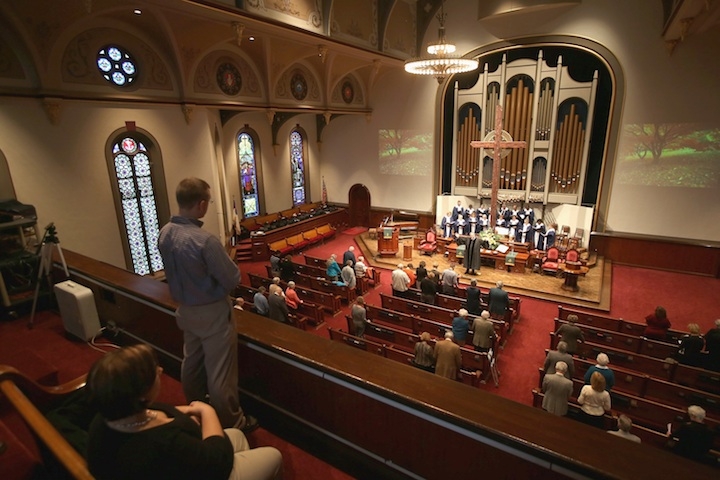Op-Ed: Presbyterians, BDS and Israel — here we go again
Published May 30, 2014

Members of the First Presbyterian Church in Warren, Ohio, attend a Sunday service in 2012. (John Moore/Getty Images)
NEW YORK (JTA) — In the charming movie “Groundhog Day,” Bill Murray’s character repeatedly relives the same day until learning from the repetition transforms him from lout to worthy wooer of his colleague, played by Andie MacDowell. The “Groundhog Day” of Presbyterian-Jewish relations is coming soon to a theater near you, but if we do not fully engage the issue, a Hollywood ending is unlikely.
The biennial General Assembly of the Presbyterian Church (USA) has regularly included an unhealthy confrontation between pro- and anti-Israel voices. This struggle is out of sync with the norms of American interreligious comity.
For the sixth time since 2004 — this time in Detroit on June 14-21 — a minority within the denomination will attempt to convince fellow Presbyterians that Israeli-Palestinian peace can be encouraged by anti-Israel resolutions; divestment from companies doing business with Israel; boycott of Israeli products produced in the territories; labeling Israel an apartheid state; and replacing church support for a two-state solution with a one-state vision signifying the end of Israel as a Jewish state.
In 2012, at the last biennial, a divestment proposal was narrowly defeated by only two votes out of 664 cast. Despite multiple defeats, divestment supporters have not given up. They are back with new tactics.
Why is this General Assembly different from all others?
The Presbyterian BDS camp has revealed its desperation by publishing a virulently anti-Israel document, “Zionism Unsettled: A Congregational Study Guide,” available for sale on the Presbyterian Church’s website. In this document, the church’s Israel/Palestine Mission Network openly admits that its argument with Israel is not about the Israeli-Palestinian territorial dispute but rather the entire Zionist enterprise and Israel’s very existence.
This screed presents Zionism as a “false theology,” “heretical doctrine,” “evil,” a “pathology,” “racism,” “colonizing” and responsible for “cultural genocide.” When asked for its response to “Zionism Unsettled,” the denomination’s leadership said, “Our Church has a long history of engaging many points of view when it comes to dialogue on critical issues facing the world around us — it’s who we are, part of our DNA.”
Really? Are there no limits? Does Presbyterian DNA include a document that respected Presbyterian theologians have labeled anti-Semitic and anti-Judaic?
While the BDS minions are harming the Presbyterian-Jewish relationship, it is not yet beyond repair. Jews and Presbyterians can still prevent a minority of Presbyterians from using the ignominious demonization and delegitimization of Israel from driving an irreparable wedge between the two religious communities.
First, Jews and Presbyterians must clearly reaffirm their commitment to a two-state solution achieved through direct negotiations between Israel and the Palestinians. That solution envisions a future Palestinian state living side-by-side in peace and security with the Jewish state of Israel. BDS, in sharp contrast, encourages and promotes the ideology of those who do not accept Israel’s existence, and therefore must be rejected.
Second, Presbyterian leadership must rein in the excesses of the Israel/Palestine Mission Network and its fellow travelers. To say that the network speaks to the church but not for the church is a cop-out. After all, the network is chartered by the church, and its propaganda is marketed by the church.
Similarly, BDS proponents should not be allowed to turn General Assembly committees discussing anti-Israel initiatives into kangaroo courts in which conclusions are pre-determined and intimidation is used to silence other voices. In April 2014, the assembly’s committee on Middle East issues deposed a moderator who dared to have a relationship with his local Jewish community and participate in interfaith trips to Israel. Where is the fairness and representativeness that are Presbyterian hallmarks?
Third, Jewish religious leaders and laypeople are encouraged to reach out to their Presbyterian friends — clergy and lay — and tell them what is being done in their name. Let them know how central Israel is to your Jewishness and how hurtful this process has been. Make sure they know of the Jewish commitment to peace and security for both Israelis and Palestinians.
Like Americans as a whole, American Christians overwhelmingly support the State of Israel, whose values and aspirations for peace they share. Presbyterians in the pews are no exception.
But a vocal minority — with tacit approval from the church’s leadership — has dominated the conversation. They cannot be allowed to turn back the clock on Presbyterian-Jewish relations.
It’s time for Presbyterians and Jews to reclaim their historic alliance on issues of mutual interest, including working together for Israeli-Palestinian peace. That would be a Hollywood ending — or, in this case, a beginning.
(Rabbi Noam E. Marans is the American Jewish Committee’s director of Interreligious and Intergroup Relations.)
![]()














